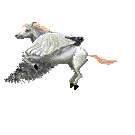Patrick Ryan writes [about me]:
The only reason he was interested, I believe, is because one of the
formants, adjectives in -i, occurs in Basque, and Larry can never
admit that Basque is related to anything on the planet.
He has not shown anything. In fact, he has ignored the Basque essay
I have done which shows conclusively that Basque is not isolated.
Professor Trask writes:
OK, OK; let's have a look, then.
Basque [-ari] is not an "agentive" suffix, but a professional suffix,
and it is a transparent borrowing from Latin. Pairs like [merkatu]
`market' and [merkatari] `merchant' will be instantly familiar to any
Latinist.
Basque [mihi] ~ [min] (and other variants) `tongue' derives from
*[bini], as shown by a wealth of evidence.
Localized [milikatu] `lick' is a late and expressivee formation.
Basque [mehe] `thin' derives from *[bene].
Basque [diti] `nipple, breast' is a transparent expressivee formation,
akin to similar forms in Romance.
Basque [hazi] does not mean `semen'; it just means `seed'. The
transferred sense of `semen' is purely literary, just as with English
`seed'.
Basque [vputz] `puff of air' is strictly imitative.
Localized [fardo] `spongy' is a variant of common northern
`soft', itself of no antiquity.
Basque [ba] does not mean `already'; it is an old affirmative
morpheme, now bleached, and akin to [bai] `yes'. You have copied a
bad mistake from Aulestia, who is no linguist and who is here trying
to translate from Spanish and getting it wrong.
Basque [matela] means `cheek', not `jaw', and it is a transparent
borrowing from Latin.
The Basque for `interval' is [arte], and [tarte] is a secondary form
extracted from the use of [arte] in final position in word-formation.
Basque [gora] `up' is nothing but a reduction of *[goi-ra], the
allative of [goi] `high place'.
Basque [bai] does not mean `indeed' (which is [baita]); it just means
`yes'.
Basque [ekaitz] `storm' is from *[egu-gaitz] `bad day', with regular
phonology.
Basque [eraman] `take away' is a simple [-ra-] causative of [joan]
`go'; the development is *[e-ra-oan] -- *[eraban] -- [eraman],
with western [eroan] showing a different development.
Basque [bat] `one' derives from earlier *[bade].
Basque [garai] `high' is probably from *[gara] `high place' plus
adjectival [-i].
Basque [uhain] ~ [uhin] `wave' is probably from [ur] `water' plus
[gain] `top'; the phonology is unremarkable.
Your alleged Basque *[ezan] (no asterisk provided) `to be (at)
concomitantly' does not exist, and you have made it up.
Basque [vpoz] `happiness' looks as much like a native Basque word as
English [pizza] looks like a native English word. It's a loan word.
Basque [vpuztu] `blow' is a transparent derivative of [putz] `puff of
air', for which you give a *different* "etymology".
Basque [ukarai] `wrist' is from [uko] `forearm' plus [garai] `high
(part)'.
The [sor-] of [sorbalda] `shoulder' is the regular combining form of
[soin] `body'.
Basque [vkako] `hook' looks as native as English [genre].
Basque [al] `be able to, can' is merely the western reduction of
eastern [ahal], itself safely derivable from *[anal].
Basque [kasu] `attention, care' could hardly be a more obvious loan
word. It's from the synonymous Spanish [caso], itself from Latin.
The Basque for `two' is [biga], of which [bi] is only a contraction.
The word for `bone' can be securely reconstructed as *[enazur] on the
basis of the comparative evidence.
Your attempt to derive [etzaldi] `nap' from [azal] `skin' is
incredible. The word is merely a contraction of the synonymous
[etzanaldi], from [etzan] `lie down' plus [aldi] `time, occasion'.
Basque [bepuru] `eyebrow' is a transparent compound of [begi] `eye'
plus [buru] `head', with perfectly regular phonology.
Need I go on? I know the etymology of [bepuru], but you want to tell
me it's from some monstrosity like *P[H]A-$E-$A-P[?]FA-R[H]E-FA
`half-like-two-bodypart.classifier-two-eye-like-chin-fall-beard-dual'?
This I should take seriously?
Larry Trask
COGS
University of Sussex
Brighton BN1 9QH
UK
larryt@cogs.susx.ac.uk
HTTP://WWW.GEOCITIES.COM/Athens/Forum/2803/Basque-Trask-1.htm

Patrick C. Ryan * 9115 West 34th Street - Little Rock, AR 72204-4441 * (501)227-9947
PROTO-LANGUAGE@email.msn.com